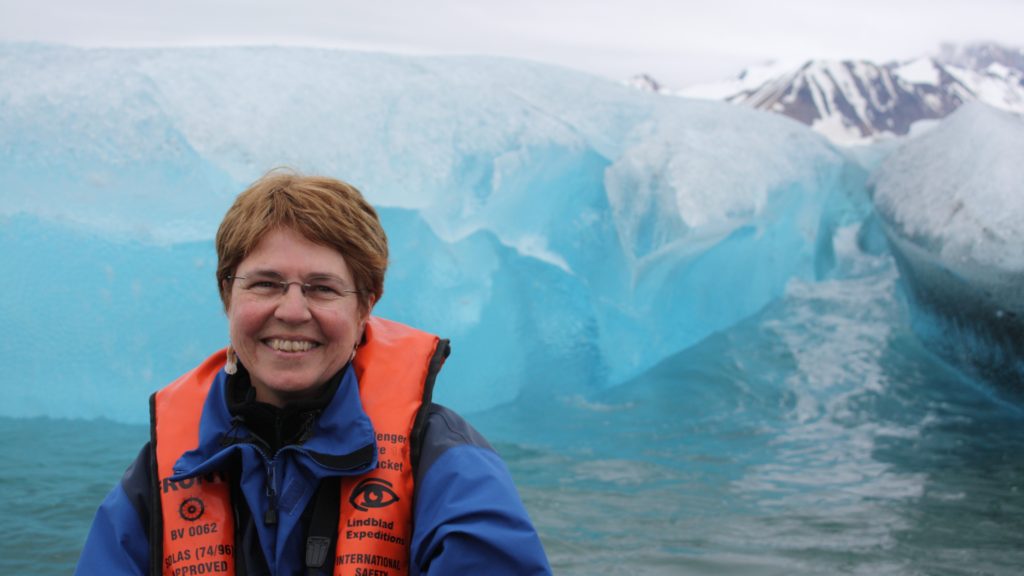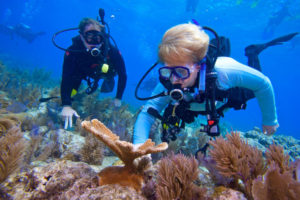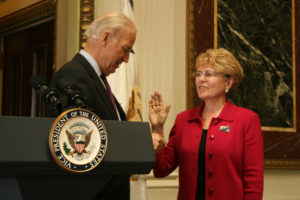
Jane Lubchenco in the Arctic. (Credit: NOAA)
by Kristen Minogue
This October, you’re invited to meet a woman who has spent decades working to save the ocean. The journey has taken her from the coasts of Oregon to Panama, New Zealand, South Africa and the Seychelles. Her name is Jane Lubchenco. In 2009, she broke ground as the first woman to head the National Oceanic and Atmospheric Administration (NOAA). But her history with the ocean began long before that.
She’ll speak in person about the future of our global ocean on the evening of Oct. 15, as part of the Smithsonian American Women’s History Initiative and the finale for the Smithsonian Environmental Research Center’s 2019 evening lectures. The full details are here. (Spoiler: It’s free.) But if you’d like a preview, here are a few snapshots from Lubchenco’s life, and her unconventional path to become one the most powerful people speaking up for the seas:

Jane Lubchenco does coral restoration in Florida in 2010. (Credit: Tom Moore/NOAA)
She grew up in a landlocked state. Born in Colorado in 1947, Lubchenco wouldn’t seem to have many chances to explore ocean science. But her family spent many summers by a manmade lake near Denver. This awakened in Lubchenco an early love for water which carried on through adolescence, when she enjoyed diving in high school and informally coached a men’s diving team in college. And with a pediatrician mother and a surgeon father, science in the Lubchenco household was inescapable.
She took just two exams in college. At Colorado College, Lubchenco was one of 20 students in a four-year experimental program with no class requirements and only two exams. Students were responsible for forging their own paths of study. Lubchenco found a summer zoology course at the Marine Biological Laboratory in Woods Hole, Massachusetts. By the end of the summer, she was hooked.
She and her husband found a creative solution to work-life balance. In 1976, Lubchenco and her husband, Bruce Menge, were on the hunt for new research positions. However, they also wanted to have children without either partner having to sacrifice a career. So they approached universities with an unusual suggestion: Allow the pair to split a single full-time position. The University of Oregon took them up on the idea. Lubchenco and Menge had their first son, Alexei, in the summer of 1978, and at just three weeks old the newborn joined them on a research trip to Panama. The couple switched to two full-time positions when their children were older.

Vice President Joe Biden swears in Jane Lubchenco as the new head of the National Oceanic and Atmospheric Administration (NOAA). (Credit: NOAA)
She made history in 2009 as the first female head of NOAA. Lubchenco was doing research in Tasmania when a member of President-elect Barack Obama’s team called, asking her to lead the National Oceanic and Atmospheric Administration. During her tenure, she oversaw the response to the Deepwater Horizon oil spill and helped save U.S. fisheries by slashing overfishing.
She gave Congress a lesson about The Weather Channel. While persuading Congress to fund new weather satellites for NOAA, Lubchenco remembers one congressman telling her, “I don’t need your weather satellites. I have The Weather Channel.” Lubchenco explained to the representative that The Weather Channel’s info actually comes from NOAA’s National Weather System—which draws much of its data from satellites.
She put forward the idea of a “social contract for science.” Lubchenco has devoted much of her life to bridging the gap between scientists and society. She put the “social contract” idea into words in a speech in 1997 (later repurposed for a 1998 Science Magazine article). In short, Lubchenco believed that scientists should help find solutions to society’s biggest problems and share their findings with the public. Since then, she’s helped launch several organizations that train scientists to be better communicators and that share the latest research without technical jargon, like Climate Central, COMPASS and the Leopold Leadership Program.
 Dr. Jane Lubchenco will give a free lecture titled “The Ocean: Our Future” on Tuesday, Oct. 15, 2019, at the Francis Scott Key Auditorium in St. John’s College. The lecture will start at 7pm, with a light reception opening at 6pm. Parking is available at the Calvert Street Garage (free after 6pm). Free and open to all. For full details, visit https://serc.si.edu/oceans-our-future.
Dr. Jane Lubchenco will give a free lecture titled “The Ocean: Our Future” on Tuesday, Oct. 15, 2019, at the Francis Scott Key Auditorium in St. John’s College. The lecture will start at 7pm, with a light reception opening at 6pm. Parking is available at the Calvert Street Garage (free after 6pm). Free and open to all. For full details, visit https://serc.si.edu/oceans-our-future.
This project received support from the Smithsonian American Women’s History Initiative. Read more stories of women making history at https://womenshistory.si.edu/stories.

